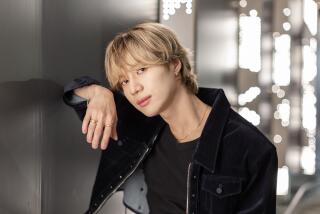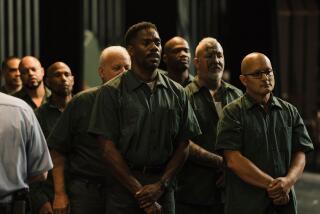Review: Hong Sang-soo’s ‘Grass’ is small, sharp and brimming with possibility
A curious feeling settled over me just a few minutes into “Grass”: I could have sworn I’d seen this movie before. Admittedly, “déjà view” is not an uncommon sensation in the work of the South Korean auteur Hong Sang-soo, whose many, many pictures — he churns them out at a rate of one or two, sometimes three, per year — increasingly feel like refinements of an endlessly malleable formula. After watching a few of his boozy, bittersweet comedies, featuring various configurations of indignant women, boorish men and free-flowing soju, you could be forgiven for assuming you’d seen them all.
But in the case of “Grass,” which will have its one and only L.A. showing Wednesday night at the Downtown Independent, my instincts didn’t deceive me. I actually had, in fact, seen this movie before, at a festival several months prior, and while the title had slipped my mind, the particulars hadn’t. In any event, it was a pleasure to encounter it again.
Tautly written and beautifully shot in black and white, “Grass” runs a little more than an hour and confines itself mostly to a coffee shop whose customers are having a day of especially fraught conversations. Two sets of characters argue bitterly over a recent tragedy. A washed-up actor asks a woman if he can move in with her, while a male filmmaker pressures a female writer to collaborate with him on a screenplay. Flirtation is on the menu; suicide too, or at least talk of it. Some will require something stronger than tea or coffee, and Hong is happy to smuggle in a bottle or two.
What distinguishes this particular set of encounters is the presence of an eavesdropper, by which I mean someone besides the audience. Seated in a corner of the shop is a young woman identified in the end credits as Areum (Kim Min-hee). She spends much of the movie on her laptop, quietly typing her observations about the tense, often noisy conversations she cannot help but overhear. Hong’s formal style is as modest and functional as ever; a camera that can pan and zoom supplies all the visual pizzazz he needs. But here, with simple cuts and an exquisite command of off-screen space, he initially raises the suggestion that Areum is not eavesdropping so much as inventing and that the men and women we meet are all figments of her imagination.
It would hardly be the first time Hong has gently undermined his own narrative premises, or invited questions about the nature of a fiction’s reality. Even after the initial riddle has been cleared up, and we see Areum not just observing but reluctantly interacting with the other patrons, a strange, productive ambiguity lingers.
Kim, the director’s most frequent collaborator of late (she appeared in his “Hotel by the River,” which played theaters earlier this year), might serve as a kind of stand-in for Hong, and perhaps even a self-indictment. She is the secretive, arrogant artist who bends reality into the stuff of fiction, someone who exploits human feeling while cautiously inoculating herself from it. Her own lunchtime sit-down with her brother (Shin Seo-kho) and his girlfriend (Ahn Sun-young) leads to one of the picture’s fiercest exchanges, suggesting that Areum may be more comfortable critiquing other people’s relationships than embarking on her own.
Hong’s narrative economy takes on the quality of a laser-focused experiment: How much intensity of emotion can he pack into a five-minute exchange between two characters we’ve never met and whose circumstances we will never truly know? Quite a lot, it turns out. More than most filmmakers, he acknowledges that, whether we are meeting with close friends or total strangers, we rarely receive more than a partial glimpse of their circumstances.
He uses that limitation, in turn, to create a limitless sense of possibility. “Grass,” true to its title, is small, sharp and bladelike. It may strike you as more of the same until you see it and its implications and possibilities begin to grow and multiply.
------------
‘Grass’
Korean dialogue with English subtitles
Not rated
Running time: 1 hour, 6 minutes
Playing: 8 p.m. Wednesday, Downtown Independent, Los Angeles
[email protected] | Twitter: @JustinCChang
More to Read
Only good movies
Get the Indie Focus newsletter, Mark Olsen's weekly guide to the world of cinema.
You may occasionally receive promotional content from the Los Angeles Times.











